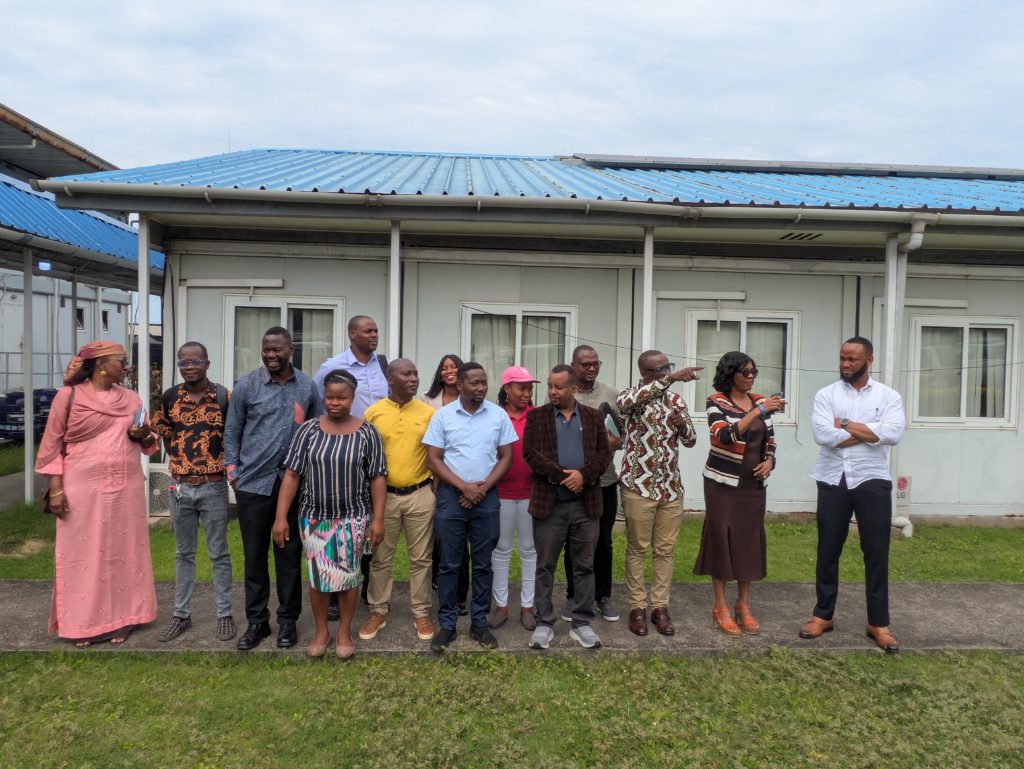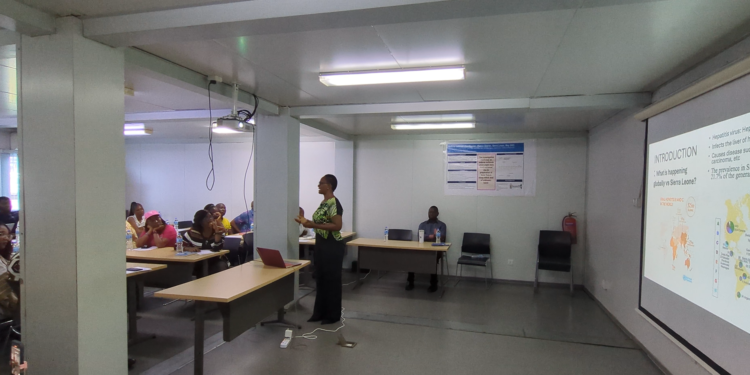By Kemo Cham
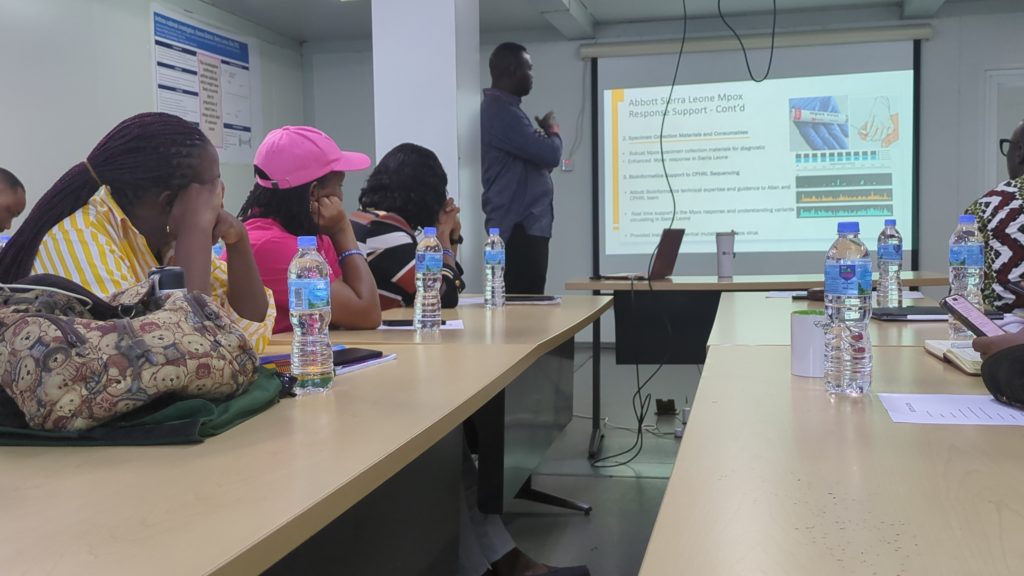
Findings from studies by a group of mainly Sierra Leonean scientists have revealed a worrying trend of viral infections in the country.
The scientists attached to the University of Sierra Leone and the Center for Biomedical and One Health Research (CBOHR) at the Koinadugu College (KC), through collaborations with local and international partners, uncovered the presence of deadly viruses hitherto considered as rare to Sierra Leone. One of the studies revealed the rare presence of a sexually transmitted infection in under-five children.
These findings from about half a dozen studies were shared at the first dissemination of research projects and findings by Project 1808, the non-profit parent organization of Koinadugu College, at an event attended by researchers, public health authorities and policy makers. The studies focused on Acute Febrile Illness and its connection to infectious diseases like Lassa fever, Ebola, malaria, typhoid and hepatitis in Sierra Leone.
Biomedical Researcher Prof. Alhaji Umar N’jai, Founder and Chief Strategist of Project 1808, is the Principal Researcher in the studies involving budding scientists under his supervision. He said the studies are part of efforts by Project 1808 in collaboration with University of Sierra Leone and Koinadugu College to build capacities of young researchers in the country. The investigations, some of which are ongoing, were done under collaborations with the Abbot Pandemic Defence Coalition (APDC) for Infectious Disease Surveillance and other emerging projects related to surveillance of various arboviruses in the country.
APDC is a global multisector scientific and public health partnership with the primary objective of early detection and mitigation of infectious disease threats of pandemic potential. Its network includes academic institutions, government and NGOs. Through its collaborations with Project 1808, it provides funding for three of the studies presented at the event on Tuesday, November 11th.
Eldred Olufemi Moore, an AFENET Sierra Leone fellow who received an Abbott TEPHINET fellowship is working on a project to establish an Acute Febrile Illness (AFI) Mortality Surveillance System at the Connaught Hospital, through funding from APDC’s Field Epidemiology Training Programme Fellowship. Jacob Turay, who just finished his undergraduate study along with other research team members are also looking at AFI surveillance, virus discovery and diagnosis with a focus on patients attending tertiary hospitals in Freetown, thanks to an APDC funding.
AFI, a condition with a sudden onset of fever, is a major public health concern in West Africa. It is associated with the same infectious agents – viruses, bacteria and parasites – that cause common illnesses like malaria and typhoid, which are endemic to the region. Through patient and mortality surveillance, these researchers track people when they are sick and also when they die. Prof. N’jai, who is also a faculty member at USL’s Fourah Bay College and College of Medicine and Allied Health Sciences (COMAHS), where all the young researchers are studying, said because of lack of AFI diagnosis and mortality surveillance, a lot of deaths from AFI and other diseases like Lassa fever go unreported in the country.
“One of the things we miss a lot is mortality surveillance. We are missing a lot from people who die from various types of Acute Febrile Illnesses. Some of the Lassa (fever) deaths, we are missing. Some of the CCHF related deaths, we are missing, though we know CCHF is circulating in-country,” N’jai said at the dissemination event at the Emergency Operation Center (EOC) of the Ministry of Health.
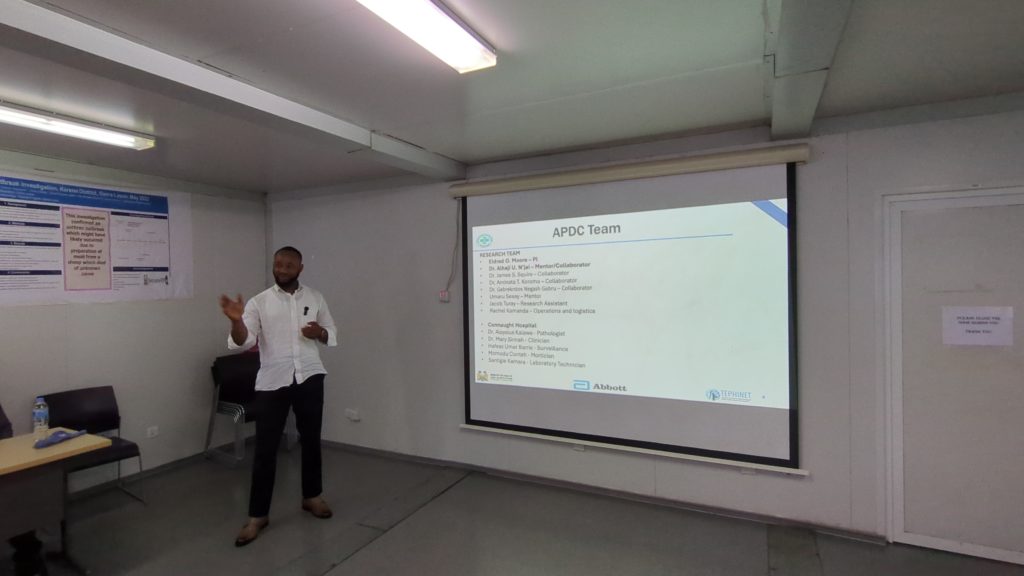
Eldred Olufemi Moore, an AFENET Sierra Leone fellow, is working on a project to establish an Acute Febrile Illness (AFI) Mortality Surveillance System at the Connaught Hospital through funding from APDC’s Field Epidemiology Training Programme Fellowship. Image, Kemo Cham, ManoReporters.
The other investigations were funded through other sources. PhD candidate Wachen Peters is profiling Hepatitis B Genome through funding from the West African Health Organization (WAHO) with additional research training support from Abbott. Her work is considered pioneering in that not only is it the first time Hepatitis B genomic genotype profiling is being done in Sierra Leone, she is also looking into finding Hepatitis D. Hepatitis B virus in combination or co-infection with Hepatitis D is usually associated with severe clinical outcomes in patients. So understanding the variants of Hepatitis B and D circulating will help in clinical management of patients in hospitals.
Esther Koroma, another young researcher, is investigating the Epidemiology and quality of life of Ebola Survivors 10 years after the West African Ebola outbreak, which ravaged Sierra Leone and its Mano River Union neighbors Guinea and Liberia. Esther’s work is in conjunction with serological work on Ebola survivors to determine host-pathogen responses and long-term immunology memory 10 years after the outbreak. The research is a collaboration between Prof. N’jai at Project 1808 and KC-Center for Biomedical and One Health Research (CBOHR) with colleagues at University of Tokyo, Japan and University of Wisconsin-Madison, USA.
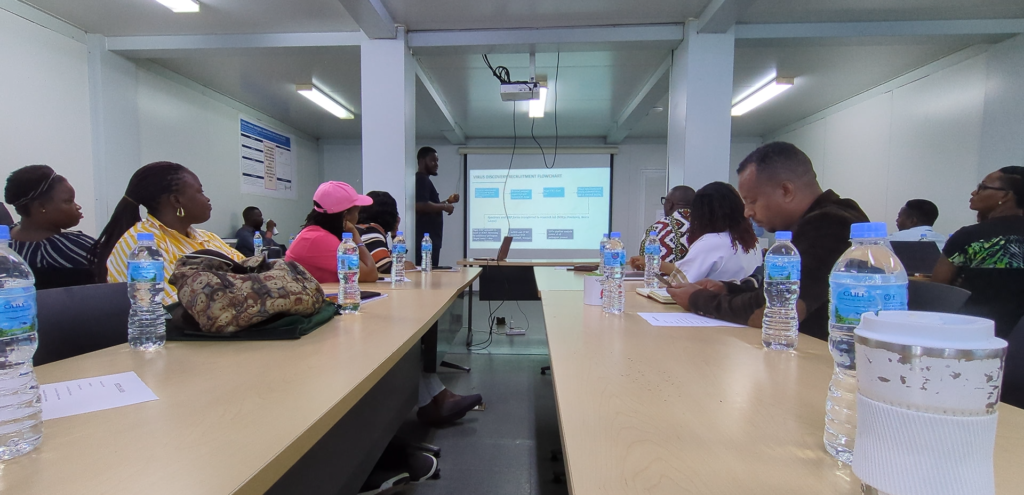
Prof. N’jai himself presented on studies he is conducting in collaboration with other international partners. Notable among these is one looking at Genomic Wastewater Environmental and Reverse Zoonosis Surveillance for Mpox in Sierra Leone to determine the possibility of a spill back from humans to the environment and domestic animals within the household, as opposed to the well-known phenomenon of viral spillover. Another study Prof. N’jai presented is a project titled, ‘Strengthening Clinical Genomics Research Capacity and Arboviruses in West Africa.’ N’jai’s partners in this multi-country study include scientists from Mali, Guinea, Liberia and Cote d’Ívoire. The goal of the project is to strengthen genomic surveillance and diagnosis of the arboviruses including dengue, zika, chikungunya and rift valley fever believed to be circulating in the sub-region.
Among the striking findings in all these studies is the detection of syphilis among young children at the Ola During Children’s Hospital (ODCH) in Freetown. The researchers consider this as worrying, given that Syphilis, a chronic disease, isn’t expected in children.
“That is something we should carry on with,” said Prof. Haja Isata Wurie of the Faculty of Medical Laboratory Sciences and Diagnostics at COMAHS, who co-supervises one of the researchers in these studies. She calls for deeper investigation into the matter.

Another striking revelation in the findings of these studies is the detection of dengue in many patients. Dengue, which causes Dengue fever, is an arbovirus that is mostly transmitted by mosquitoes, like Malaria. Sierra Leone is not among countries considered at high risk for Dengue. But according to this study, the virus was found to be present in many parts of the country, as revealed by results from the country’s major hospitals, including Connaught, Cottage, Rokupa and the privately run high-end Choitram Hospital. For Prof. N’jai, the presence of a virus like Dengue in Sierra Leone is particularly concerning given its serotypes, which make it easily mistakable for other haemorrhagic fever diseases like Ebola.
“It (Dengue) is very similar sometimes to Ebola …and as a country, we are not actively diagnosing and doing notifications for dengue at the hospitals,” N’jai said in an interview with ManoReporters. “So sometimes people come up with a haemorrhagic fever that is potentially dengue and then people think it is Ebola, and when test for Ebola is done and they find it is negative, they forget about it.”
Another worrying discovery by the Project 1808 researchers was the Bacillus anthracis – the bacteria that causes anthrax – a serious infectious disease that affects livestocks but which can also affect humans through contacts with infected animals or contaminated products. N’jai said an interesting thing about this discovery is that they were not looking for such a pathogen.
“It’s very exciting and worrying: exciting that we are able to detect them now, but worrying that we have a lot of these things in the population that need urgent attention and need policy makers to pay attention to them,” he said.
While these studies indicate progress in science and research in Sierra Leone, the testimonies from Tuesday’s deliberations revealed major constraints, from challenges of funding in the form of scholarships, to infrastructure deficiencies.
“I see a lot of potentials here…We are up there. We are trying to move in terms of research…,” said Prof. Wurie, calling on the young researchers to cultivate the culture of working as a team with the goal of providing “more solid” data.
Dr. Gebrekrstos Negash Gebru, Head of the African Field Epidemiology Network (AFENET) in Sierra Leone, sees “a lot of capacity” being built in the research projects. But he said the focus should also include linking all the findings to clinical practice.
“How are we linking the findings in those researches to improve clinical practice” and “to inform public health practice,” he said.
For Project 1808 and its partners at University of Sierra Leone and Koinadugu College, collaborations with partners like APDC not only allows for doing the research, they also contribute to building capacity locally and in doing so by generating masters and PhD graduates, says N’jai. But he warns that much more attention is needed from policy makers to improve further on the progress achieved. His organization secured advanced laboratory equipment like refrigeration facilities through these international partnerships. Still, it has to ship samples abroad, like the Dakar-based Institut de Recherche en Santé, de Surveillance Epidémiologique et de Formation (IRESSEF) for Next Generation Sequencing, which is not readily available locally. N’jai says the goal is to conduct sequencing in-country as capacity increases.
He stressed that the goal is not just to build the capacities of young researchers, but also to retain them in the system. And part of efforts to realise this also requires innovations within the academic systems, like conducting periodic sessions or seminar series, he noted.
“I think training this young group of scientists is the future. It is what we want to begin to build the ecosystem of young researchers who can also do science,” he says.
“What we want to show is that a lot of these young researchers that we are mentoring in Sierra Leone, some of whom have just passed through their bachelors and now hoping to get to their masters, for them to be able to appreciate research, appreciate science and for them to begin to see that they are part of discovering things that are around them.”
